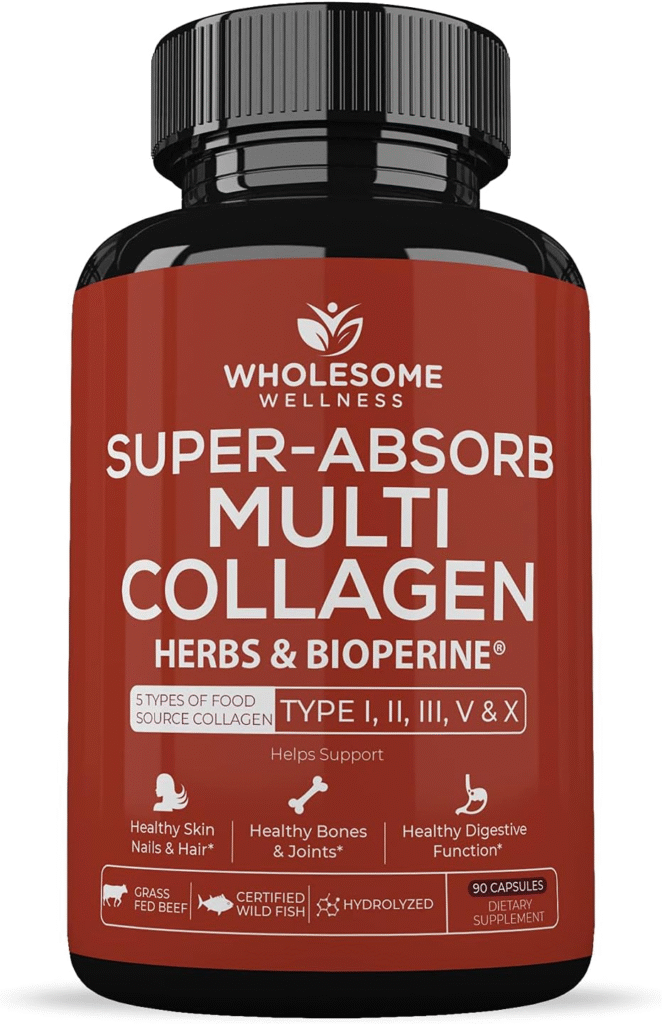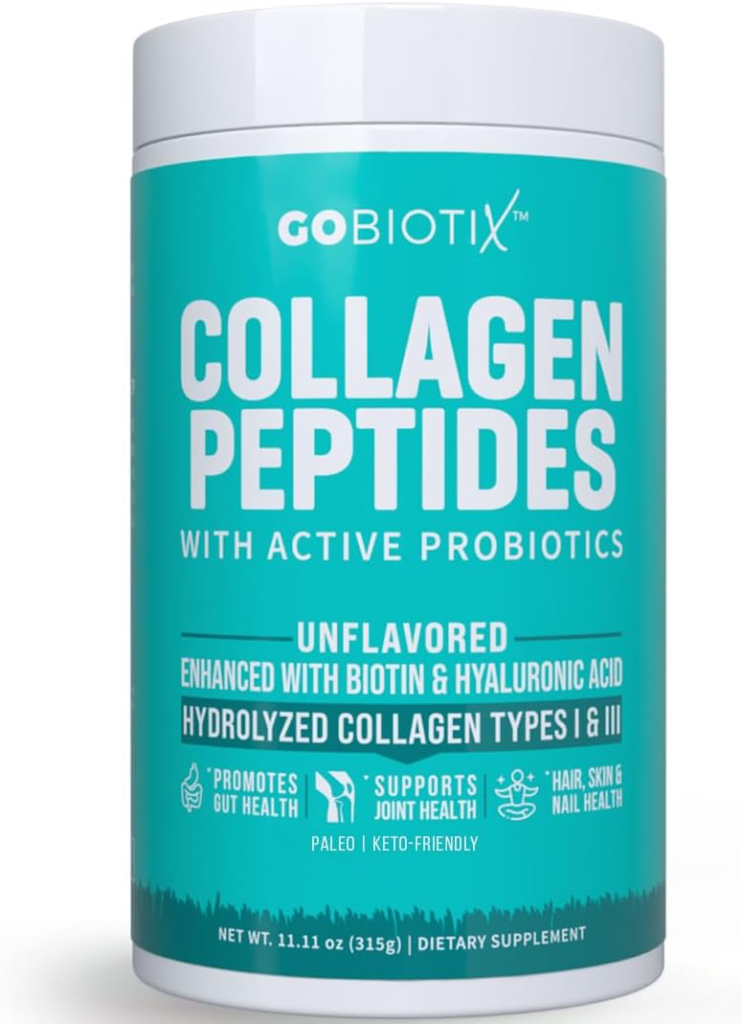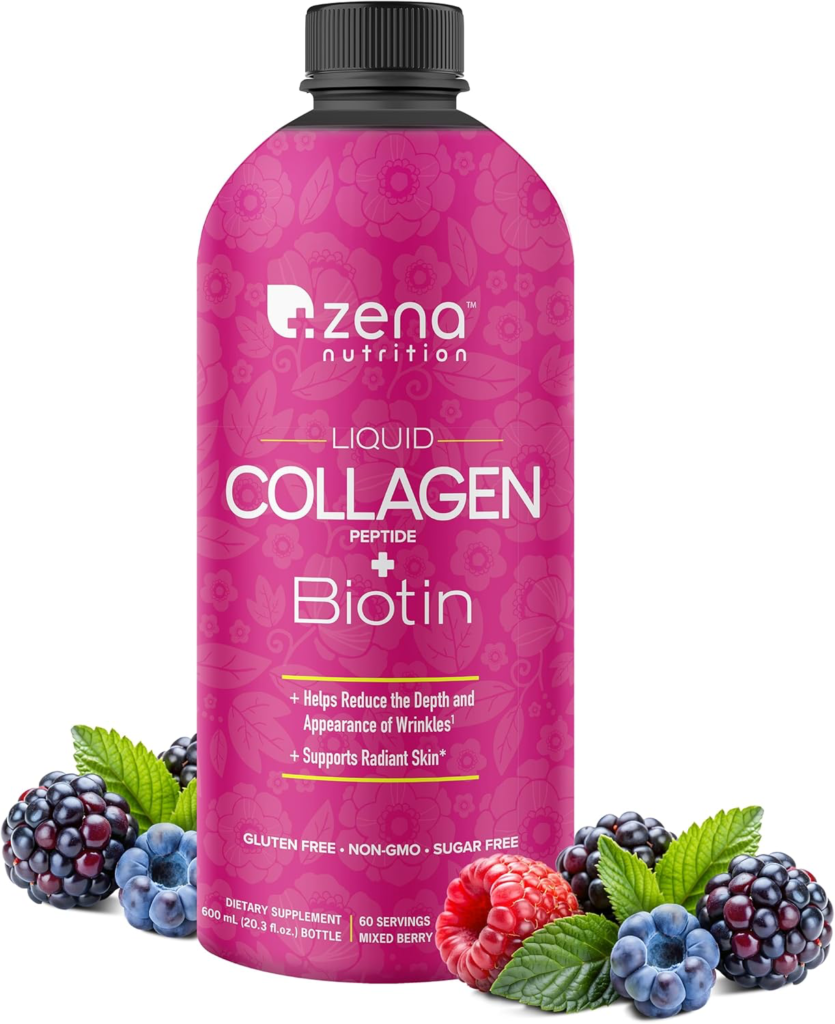
As someone who’s battled Irritable Bowel Syndrome (IBS) for years, I’ve explored countless remedies and supplements. Collagen has been a game-changer for my digestive well-being.
In this comprehensive guide, I’ll share my insights and research on the best collagen supplements for IBS and how they can potentially improve your gut health.
Understanding Collagen’s Role in Gut Health
Collagen is the most abundant protein in our bodies, acting as the ‘glue’ that holds our tissues together. It’s benefits extend far beyond skin health, playing a crucial role in maintaining the integrity of our intestinal lining.
For IBS sufferers, a compromised gut barrier (often called ‘leaky gut’) can exacerbate symptoms and trigger inflammation. Collagen is rich in amino acids like glycine, proline, and glutamine, which have anti-inflammatory properties and can help repair damaged gut tissue.
By strengthening the gut lining, collagen may reduce the severity of IBS symptoms and improve overall digestive function. This protein supports the structural integrity of the intestinal wall, potentially reducing permeability and helping to reduce common IBS symptoms like bloating, abdominal pain, and irregular bowel movements. There are some great options available on Amazon.
Disclaimer: This post contains affiliate links. If you make a purchase through these links, I may earn a small commission at no additional cost to you. Thank you for supporting Vital Women Wellness!
Top Collagen Supplements for IBS
1. Marine Collagen Peptides
Marine collagen, derived from fish, is highly bioavailable, meaning our bodies can absorb and use it efficiently. It’s particularly rich in type I collagen, which is crucial for gut lining repair.
When choosing marine collagen, look for products sourced from wild-caught fish to confirm the highest quality and purity. These supplements often come in powder form, making them easy to incorporate into your daily routine.
Marine collagen has shown promise in reducing inflammation and supporting gut health. It’s smaller peptide size compared to other collagen sources may contribute to it’s superior absorption rate, potentially leading to more effective results for IBS sufferers.
Available: Marine Collagen Peptides by Codeage

2. Grass-Fed Bovine Collagen
Bovine collagen, sourced from cows, offers a potent blend of type I and type III collagen. This combination supports both gut health and overall connective tissue strength.
When selecting bovine collagen, opt for grass-fed sources to avoid potential exposure to antibiotics or hormones that could irritate your gut. Grass-fed bovine collagen is often more sustainable and may contain higher levels of beneficial nutrients.
This type of collagen is particularly beneficial for supporting the structure of the intestinal wall and may help reduce gut inflammation. It’s diverse amino acid profile can contribute to overall digestive health and potentially reduce some IBS symptoms.
Available: Vital Proteins Collagen Peptides

3. Multi-Collagen
Multi-collagen blends combine various collagen types (often including types I, II, III, V, and X) from different sources. This diversity can provide a broader spectrum of benefits for gut health and beyond.
These comprehensive formulas aim to support not just gut health and joint function, skin elasticity, and hair strength. For IBS sufferers, the varied collagen types may offer more comprehensive support for the entire digestive system.
Multi-collagen powders often include extra gut-supporting ingredients like probiotics or digestive enzymes, enhancing their potential benefits for IBS management.
Available: Wholesome Wellness Super-Absorb Multi Collagen Pills

4. Collagen with Probiotics
Some innovative supplements combine collagen with gut-friendly probiotics. This dynamic duo can support both gut lining repair and microbiome balance – a win-win for IBS sufferers.
Probiotics help maintain a healthy balance of gut bacteria, which is often disrupted in IBS. When combined with collagen, these supplements may offer a two-pronged approach to gut health: supporting the physical structure of the gut lining while also promoting a healthy microbiome.
Look for products that specify the strains and quantities of probiotics included, as different strains can have varying effects on gut health.
Availabe: GoBiotix Collagen Peptides with Active Probiotics

5. Liquid Collagen Supplements
For those who struggle with powders or capsules, liquid collagen offers an easily digestible choice. Many liquid formulations also include extra nutrients that support gut health.
Liquid collagen supplements are often more readily absorbed by the body, which can be particularly beneficial for people who have compromised digestive systems. These products often contain extra ingredients like hyaluronic acid or vitamin C, which can support overall gut health and collagen production.
The convenience of liquid supplements may also encourage consistent use, which is key to seeing potential benefits in IBS symptom management.
Available: Zena Nutrition Liquid Collagen Peptide + Biotin

Implementing Collagen Supplements in Your IBS Management Plan
Adding collagen to your routine involves integrating it effectively into your overall IBS management strategy. Here’s how to get started:
Start Low and Slow
Begin with a small dose and gradually increase over time. This approach allows your body to adjust and helps you identify any potential sensitivities.
Start with about 5-10 grams per day and slowly work your way up to the recommended dosage on the product label, typically around 20 grams daily.
Consistency is Key
For best results, take your collagen supplement daily. Many people find morning or evening routines work well.
You might consider setting a daily reminder or associating your collagen intake with an existing habit, like your morning coffee or evening tea.
Mix It Up
Most collagen powders are flavorless and can be easily mixed into beverages or foods. Try adding it to your morning coffee, smoothies, or even soups.
Experiment with different recipes to find what works best for you.
Some people enjoy mixing collagen into oatmeal, yogurt, or even baked goods.
Pair with Gut-Friendly Foods
Enhance the benefits by consuming your collagen with other gut-supporting foods like bone broth, fermented vegetables, or prebiotic-rich foods. This combination approach can amplify the positive effects on your digestive system.
Track Your Progress
Keep a journal of your symptoms and any changes you notice. This can help you gauge the effectiveness of the supplement over time.
Note factors like bowel movement frequency and consistency, bloating levels, and overall digestive comfort.
Potential Challenges and How to Overcome Them
While collagen supplements are generally well-tolerated, some IBS sufferers may experience challenges:
Digestive Discomfort
If you notice increased bloating or discomfort, try reducing your dose or switching to a different type of collagen. Some people find that hydrolyzed collagen or collagen peptides are easier to digest than whole collagen proteins.
Taste Issues
Some people find certain collagen supplements have an off-putting taste. Experiment with different brands or try flavored options.
You can also mask the taste by mixing collagen into strongly flavored foods or beverages.
Allergies
If you have fish or shellfish allergies, avoid marine collagen and opt for bovine or plant-based choices. Always check the ingredient list carefully and ask with your healthcare provider if you have any concerns about allergies.
Cost Concerns
Quality collagen supplements can be pricey. Look for sales, buy in bulk, or consider less expensive bovine options if marine collagen is out of your budget.
Some health insurance plans may cover collagen supplements if prescribed by a healthcare provider for specific medical conditions.
Adapting Collagen Use to Your IBS Subtype
IBS manifests differently for everyone, and your collagen strategy should reflect that:
IBS-D (Diarrhea-predominant)
Focus on collagen supplements that include extra gut-soothing ingredients like L-glutamine or marshmallow root. These extra components can help reduce inflammation and support the gut lining, potentially reducing diarrhea frequency and severity.
IBS-C (Constipation-predominant)
Look for collagen blends that include fiber or magnesium, which can help promote regularity. You might also consider pairing your collagen supplement with a gentle, natural laxative like psyllium husk or prune juice.
IBS-M (Mixed type)
A pure collagen supplement might be best, allowing you to adjust other aspects of your diet as needed. This flexibility can be crucial for managing the unpredictable nature of mixed-type IBS.
Advanced Collagen Strategies for IBS Management
As you become more comfortable with collagen supplementation, consider these advanced strategies:
Collagen Cycling
Some experts suggest cycling on and off collagen to prevent tolerance. Try 3 months on, 1 month off.
This approach may help maintain the supplement’s effectiveness over time and give your body a chance to reset.
Targeted Timing
Experiment with taking collagen at different times of day to see when it’s most effective for your symptoms. Some people find that taking collagen on an empty stomach in the morning helps kickstart their digestive system, while others prefer taking it before bed to support overnight gut repair.
Synergistic Supplements
Combine collagen with other gut-supporting supplements like zinc carnosine or quercetin for enhanced benefits. Always ask with a healthcare provider before combining many supplements to confirm safety and avoid potential interactions.
DIY Collagen Blends
Create your own custom blend by combining different types of collagen powders to target your specific needs. For example, you might mix marine collagen for it’s high bioavailability with bovine collagen for it’s diverse amino acid profile.
Exercises to Enhance Collagen’s Effectiveness
To maximize the benefits of your collagen supplement, try incorporating these practices:
Stress-Reduction Techniques
Practice deep breathing or meditation to support the gut-brain axis and enhance collagen’s effects. Stress can significantly impact IBS symptoms, so managing stress levels is crucial for overall gut health.
Try incorporating a 10-minute meditation session into your daily routine, focusing on deep, diaphragmatic breathing. This can help reduce stress hormones that may exacerbate IBS symptoms and create a more favorable environment for collagen to work effectively.
Gentle Yoga
Certain yoga poses can promote digestive health and may complement collagen’s gut-healing properties. Poses like Cat-Cow, Child’s Pose, and gentle twists can help stimulate digestion and reduce stress on the gut.
Consider starting your day with a short yoga routine focused on gentle stretches and poses that target the abdominal area. This can help improve circulation to the digestive organs and potentially enhance the absorption and utilization of collagen.
Here’s a great yoga mat on Amazon if you’d like to incorporate more yoga into your week.
Mindful Eating
Practice eating slowly and mindfully to support optimal digestion and nutrient absorption. This approach can help reduce the stress on your digestive system and may enhance the effectiveness of your collagen supplement.
Take time to chew your food thoroughly, put your utensils down between bites, and focus on the flavors and textures of your meal. This mindful approach can help reduce overeating and minimize digestive discomfort.
Hydration Challenge
Aim to drink half your body weight in ounces of water daily to support collagen production and overall gut health. Proper hydration is crucial for maintaining the integrity of the gut lining and supporting the body’s natural collagen production.
Consider setting reminders throughout the day to drink water, or invest in a water bottle with time markers to help you stay on track. You can also incorporate herbal teas or infused water if you find plain water unappealing.
This water bottle is one of my favoriate ways to increase my hydration: Hydration Reminder Water Bottle
The Science Behind Collagen and IBS
Understanding the scientific basis for collagen’s potential benefits in IBS management can help you make informed decisions about supplementation.
Gut Permeability and Collagen
Research has shown that increased intestinal permeability, often referred to as “leaky gut,” may play a role in IBS symptoms. Collagen, particularly type III collagen, is a major component of the intestinal wall.
Supplementing with collagen may help strengthen this barrier, potentially reducing the passage of harmful substances into the bloodstream and alleviating IBS symptoms.
A study published in the Journal of Clinical Gastroenterology found that patients with IBS had lower serum collagen levels compared to healthy controls, suggesting a potential link between collagen deficiency and IBS symptoms.
Anti-Inflammatory Properties
The amino acids in collagen, particularly glycine and proline, have been shown to have anti-inflammatory properties. Chronic low-grade inflammation is often associated with IBS, and reducing this inflammation may help reduce symptoms.
A review in the Amino Acids journal highlighted glycine’s potential to reduce inflammation in the gut and it’s possible therapeutic applications in intestinal disorders.
Microbiome Support
Emerging research suggests that collagen peptides may act as a prebiotic, supporting the growth of beneficial gut bacteria. A healthy gut microbiome is crucial for proper digestion and may help reduce IBS symptoms.
A study in the journal Nutrients found that collagen peptides promoted the growth of beneficial bacteria like Bifidobacterium in the gut, which could have positive implications for digestive health.
Lifestyle Factors to Consider Alongside Collagen Supplementation
While collagen supplements can be a valuable tool in managing IBS symptoms, they work best as part of a comprehensive approach to gut health. Consider these lifestyle factors:
Diet Modifications
Many IBS sufferers find relief by following specific dietary approaches, such as the low FODMAP diet or eliminating common trigger foods. Combining these dietary strategies with collagen supplementation may enhance overall gut health and symptom management.
Work with a registered dietitian to develop a personalized eating plan that incorporates collagen-rich foods and avoids your specific trigger foods.
Sleep Hygiene
Quality sleep is crucial for gut health and overall well-being. Poor sleep can exacerbate IBS symptoms and may interfere with the body’s natural collagen production.
Establish a consistent sleep schedule, create a relaxing bedtime routine, and aim for 7-9 hours of sleep per night. Consider using blackout curtains or a white noise machine to create an optimal sleep environment.
Regular Exercise
Moderate exercise can help regulate bowel movements, reduce stress, and support overall gut health. However, intense exercise may exacerbate symptoms in some IBS sufferers.
Find a balance that works for you, incorporating gentle activities like walking, swimming, or yoga into your routine. Start with short sessions and gradually increase duration and intensity as tolerated.
Stress Management
Chronic stress can significantly impact IBS symptoms and may interfere with the body’s ability to utilize collagen effectively. Implementing stress-reduction techniques is crucial for managing IBS and supporting overall gut health.
In addition to meditation and yoga, consider exploring other stress-management techniques like journaling, progressive muscle relaxation, or engaging in hobbies you enjoy.
Potential Side Effects and Precautions
While collagen supplements are generally considered safe for most people, it’s important to be aware of potential side effects and take necessary precautions:
Digestive Symptoms
Some people may experience mild digestive symptoms when starting collagen supplements, such as bloating or changes in bowel movements. These effects are usually temporary and resolve as your body adjusts to the supplement.
Allergic Reactions
If you have allergies to fish, shellfish, or eggs, be cautious when choosing collagen supplements, as some are derived from these sources. Always check the ingredient list and opt for hypoallergenic options if necessary.
Interactions with Medications
Collagen supplements may interact with certain medications, particularly those that affect blood clotting. If you’re taking any medications, ask with your healthcare provider before starting collagen supplementation.
Pregnancy and Breastfeeding
While collagen is generally considered safe during pregnancy and breastfeeding, there’s limited research on it’s effects during these periods. Consult with your healthcare provider before starting any new supplement regimen during pregnancy or while breastfeeding.
Long-Term Considerations for Collagen Supplementation
As you incorporate collagen into your IBS management plan, consider these long-term factors:
Consistency and Patience
The benefits of collagen supplementation may take time to become apparent. Consistency is key, and it may take several weeks or even months to notice significant improvements in your IBS symptoms.
Regular Reassessment
As your body changes and adapts, your collagen needs may change as well. Regularly reassess your symptoms and adjust your supplementation strategy as needed. Consider working with a healthcare provider to watch your progress and make informed decisions about your long-term collagen use.
Combining with Other Therapies
Collagen supplementation can be a valuable component of a comprehensive IBS management plan. Consider combining it with other evidence-based therapies, such as cognitive-behavioral therapy or gut-directed hypnotherapy, for a holistic approach to managing your symptoms.
Sustainability Considerations
As you choose collagen supplements for long-term use, consider the environmental impact of different sources. Look for brands that prioritize sustainable sourcing practices and eco-friendly packaging.
Frequently Asked Questions
What is the best type of collagen for IBS?
Marine collagen and grass-fed bovine collagen are often considered the best types for IBS due to their high bioavailability and gut-supporting properties. However, the best type can vary depending on individual needs and sensitivities.
How long does it take for collagen to improve gut health?
While individual responses vary, many people report noticing improvements in their gut health within 4-8 weeks of consistent collagen supplementation. However, some may experience benefits sooner, while others may need longer.
Can collagen supplements cause constipation?
Collagen supplements are generally not known to cause constipation. In fact, they may help improve bowel regularity for some people.
However, if you experience constipation after starting collagen, try increasing your water intake or reducing your dosage.
Is it safe to take collagen supplements daily?
For most people, taking collagen supplements daily is considered safe. However, it’s always best to follow the recommended dosage on the product label and ask with a healthcare provider, especially if you have any underlying health conditions.
Can collagen help with leaky gut syndrome?
Collagen may help support the integrity of the intestinal lining, potentially benefiting those with leaky gut syndrome. Its amino acids can help repair and strengthen the gut barrier, which may reduce intestinal permeability.
Are there any plant-based alternatives to animal-derived collagen for IBS?
While true collagen is only found in animal sources, there are plant-based supplements that support the body’s natural collagen production. These often contain ingredients like vitamin C, silica, and amino acids.
However, their effectiveness for IBS specifically may vary.
How does collagen compare to other gut-healing supplements like L-glutamine?
Collagen and L-glutamine both support gut health but work in slightly different ways. Collagen provides structural support to the gut lining, while L-glutamine is an amino acid that serves as fuel for intestinal cells.
Some people find benefits from using both in combination.
Can collagen supplements interfere with IBS medications?
Collagen supplements generally don’t interfere with common IBS medications. However, it’s always best to ask with your healthcare provider before adding any new supplement to your regimen, especially if you’re taking prescription medications.
Is there a best time of day to take collagen for IBS symptoms?
The best time can vary depending on individual preferences and responses. Some people find taking collagen in the morning on an empty stomach works best, while others prefer taking it before bed. Experiment to find what works best for you.
Can collagen supplements help with IBS-related skin issues?
Collagen supplements may help improve skin health, which can be beneficial for IBS sufferers who experience related skin issues. The amino acids in collagen support skin elasticity and hydration, potentially addressing problems like dry or irritated skin.
Key Takeaways
- Collagen supplements can play a significant role in managing IBS symptoms by supporting gut lining integrity and reducing inflammation.
- High-quality collagen sources like marine or grass-fed bovine collagen, and blends with extra gut-supporting ingredients, are often most beneficial for IBS sufferers.
- Start with a low dose of collagen and gradually increase, paying close attention to how your body responds.
- Consistency is crucial – make collagen supplementation a daily habit for best results.
- Combine collagen with other gut-friendly practices like stress reduction, mindful eating, and regular exercise for a comprehensive approach to IBS management.
Disclaimer
The information contained in this post is for general information purposes only. The information is provided by The Best Collagen Supplements for IBS and while we endeavor to keep the information up to date and correct, we make no representations or warranties of any kind, express or implied, about the completeness, accuracy, reliability, suitability or availability with respect to the website or the information, products, services, or related graphics contained on the post for any purpose.

